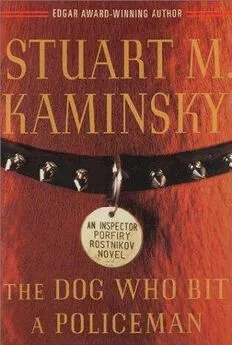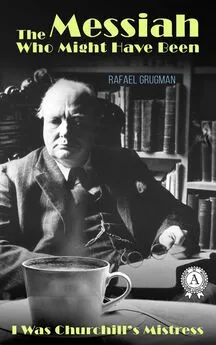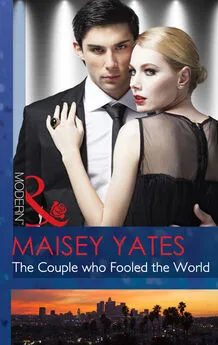Stuart Kaminsky - The Dog Who Bit a Policeman
- Название:The Dog Who Bit a Policeman
- Автор:
- Жанр:
- Издательство:неизвестно
- Год:неизвестен
- ISBN:нет данных
- Рейтинг:
- Избранное:Добавить в избранное
-
Отзывы:
-
Ваша оценка:
Stuart Kaminsky - The Dog Who Bit a Policeman краткое содержание
The Dog Who Bit a Policeman - читать онлайн бесплатно полную версию (весь текст целиком)
Интервал:
Закладка:
“Perhaps,” said Zelach.
Iosef stood silently considering some way of capitalizing on the talent of the man at his side.
Sasha’s head was a hot balloon of searing hangover pain. His stomach threatened nausea. There was no place he wanted to be.
He didn’t want to be lying down in the hotel room, where the ceiling insisted on going back and forth like a light boat on the water.
Even if he could, he didn’t want to go home to his wife, children, and mother, where he would get no rest. And, besides, he had been ordered not to go home. He didn’t want a hot shower. He didn’t want to eat. All he wanted to do was sit alone in a darkened room and moan.
Instead, he leaned back confidently in the antique wooden-armed chair and accepted a cup of strong coffee from Illya Skatesholkov.
They were in a large, expensive, and tastefully decorated office in Zjuzino on Khaovka not far from the Church of Boris and Gleb.
The office was on the second floor of a line of high rises built in the 1950s. This series of high rises was better maintained than most.
Sasha had been called and then picked up at the hotel by a white American Lincoln limousine. The driver had not spoken, and Sasha, who was supposed to be a Ukrainian, looked out at the miles of apartments, wasteland, and remaining memories of small villages. Down many of the roads, Sasha knew, were communities of dachas, many old and crumbling, some being renovated right down to Jacuzzis and swimming pools, which their owners could use only a month or two each year.
More than ninety percent of the people of Moscow live beyond the Outer Ring Circle. Tourists and visiting businessmen seldom go beyond the Ring, and even those who come frequently have no idea of how most Muscovites live. They live not well. Amid oases of parks, athletic stadiums, restored churches, and even a steeple-chase race course are miles of apartment buildings from whose windows hang laundry and in whose corridors children steal from children, adults fight over water and inches of space, and families depressed by lack of food and money battle over meaningless slights.
Sometimes these conflicts led to serious injury or even death.
On more than one occasion, if the identity of the one who committed the crime was not immediately obvious to the uniformed police who were first on the scene, Sasha had been part of an investigation.
A moment of near panic. What if someone in this building recognized him, approached him? This fear was a familiar one, one that came whenever Sasha went undercover, which was frequently.
He had nightmares about being exposed, pointed at by a child or a woman carrying a baby, or by an old man. The person pointed to him and screamed his name and he tried to run, with some deadly presence close behind. He would pass people, young, old, and they would point at him and scream. Once, he had been pointed out in a dream by an obviously blind young man.
Sasha came out of the state of panic, hoping it had not been noticed. The pain of the hangover, that was what caused this weakness, that and. . He turned his attention back to the bleak miles of apartment buildings.
Some of these complexes were in decay. Some were reasonably well maintained by residents determined to retain dignity if not great hope. Sasha had been in buildings like this. He knew.
And now he sat in a ground-floor apartment which had been converted into period luxury, right down to expensive wallpaper.
Sasha felt as if he had walked through a door into another century.
He sat with Illya Skatesholkov and Boris Osipov drinking coffee and discussing the events of the previous night. Both Boris and Illya, though they tried not to show it, were noticeably nervous.
“So,” said Boris, “what did you think of our little arena?”
Sasha looked around and said, “Impressive.”
Boris let out a mirthless laugh and said, “Not the office. The dog ring. Last night.”
“Impressive also,” said Sasha, drinking some coffee. The pain in his head was nearly unbearable, and he feared his nausea would force him to ask for the rest room. He fought the nausea and affected a small, knowing smile. The Yak had approved the purchase of three suits, complete with silk shirts, ties, and shoes. He was wearing the second of the suits. Elena was taking care of having the one he wore yesterday cleaned, a task she clearly felt should be his, but when the call had come she accepted the responsibility with minimal reluctance.
“And Tatyana?” asked Illya.
“Impressive,” Sasha repeated, taking another sip of his very good coffee.
So that was her name. Oh, he had been drunk. As his mother, Lydia, would say, remembering her long-dead husband, he had been “drunk as a cross-eyed cossack.” It had been Sasha’s impres-sion since first hearing the expression that he had seen few cossacks and none that he could recall having crossed eyes.
“Versatile,” said Illya.
“Yes,” Sasha agreed, preferring not to discuss the woman who had led him off to a room after the dogfight. He had been drunk, but she had been beautiful and talented. She enjoyed her work and so had Sasha.
His two hosts smiled.
“We have made some inquiries about you and your Kiev operation,” said Boris.
Sasha noted that neither of the two men moved behind the huge cherrywood desk, impressive due to its size and ornate legs and because there was nothing on its polished surface, not even a telephone. Both of his escorts sat in chairs identical to the one in which Sasha sat back with his legs folded. The chair behind the desk, Sasha assumed, was reserved for the person for whom his hosts worked. “Chair” was hardly the word for it. It, like the desk, was of another century. The very high-backed chair, with each dark wood arm coming forward to clasp a wooden ball, looked as if it belonged in a museum.
“And?” asked Sasha, sipping carefully to avoid spilling on his perfectly pressed suit.
“We are informed that you have a growing operation,” said Boris, “not equal to ours, but growing rapidly.”
Sasha nodded.
“From what I have seen of your operation,” said Sasha, “I would say that mine is already equal to yours.”
“Let’s not bicker about size,” said Illya. “It is sufficient that you have a prospering operation. We would like to discuss a proposal, a proposal that would make your operation part of our operation, a proposal that would certainly double or even triple your earn-ings, a proposal that would make you part of an international syndicate growing each week. We would bring some of our dogs to Kiev. You would bring some of your dogs to Moscow. We would provide advice from our dog trainers. We would locate and draw bettors, high-stakes bettors, to your operation.”
“I am doing well on my own,” said Sasha.
“You could be doing better with us,” said Boris.
“I’ll consider it,” said Sasha. “I’ll have to talk to some of my people.”
“Of course,” said Boris. “We believe our arguments can be very persuasive.”
Boris spoke with a friendly smile but Sasha recognized the threat, as he was intended to do. “I’m sure,” Sasha said. “I have some questions about the details of this merger.”
“Ask your questions and we will come back to you with answers,” said Illya, leaning forward, hands clasped together.
“I would prefer to ask my questions and get my answers from your boss,” Sasha said, trying to duplicate the way Jean Paul Bel-mondo had said nearly the same thing in an old French movie Sasha had recently seen on the television.
“Perhaps,” said Boris. “We will see. Meanwhile, you have a dog you wish to enter into our fights to show us the quality of your kennel?”
“A pit bull,” said Sasha. “If the effort proves profitable, he can fight again and we can begin our negotiations with my bringing more dogs.”
“Your animal is good?” asked Illya.
“My dog will win,” said Sasha with a smile and a tone of confidence he did not feel. He was speaking from information provided by an older uniformed MVD officer named Mishka, who had tended and overseen the training of the dogs of Petrovka for a quarter of a century. Mishka had dogs that could locate drugs, seek out hiding fugitives, and attack when signaled to do so.
Mishka had assured Elena and Sasha that Tchaikovsky, the pit bull, would kill any human or animal on command. Mishka was particularly proud of Tchaikovsky, who had been named thus because the famous composer had lived in Mishka’s hometown of Klin, an hour northwest of Moscow on the old Leningrad Highway.
The beagle-faced Mishka had warned the two young officers that they were to be very careful with Tchaikovsky.
The white pit bull with black spots had seemed docile enough when Mishka had taken him from his pen, petting him and talking softly to the dog, even nuzzling the animal with his head.
Tchaikovsky had wagged his tail.
“Don’t be deceived,” Mishka had said as he petted the animal.
“Our Tchaikovsky can, on command or on his own if provoked, or even for no reason, attack and sink his teeth into an antagonist with deadly and determined ferocity. Getting Tchaikovsky to release his grip can be very difficult, and if it is a death grip, it can be nearly impossible until the victim is dead.”
“That is very reassuring,” Sasha had said, and Mishka, recognizing no irony in the comment, had responded:
“Yes.”
Sasha was not particularly confident about placing his safety in the jaws of a pit bull. These were dangerous men. If the pit bull didn’t do well, Sasha might be in very serious trouble.
Illya and Boris, a bit clumsily, questioned Sasha, whom they knew as Dmitri Kolk, about Kiev. Sasha had casually responded using his wife, Maya’s, history in Kiev as his own. In spite of the desire to get back to the hotel room, turn off the lights, and close the drapes, he chatted, drank, accepted some Italian biscotti, which he normally liked but which now caused a renewed wave of queasi-ness, and made himself as amiable as possible.
“It is getting a bit late and you will want to prepare your dog,”
said Boris, standing.
“Yes,” said Sasha, taking a final bite of biscotti and saying, “delicious.”
“Thank you,” said Illya. “Our driver will take you back to the hotel.”
“Good,” said Sasha, straightening his slacks and adjusting his blue silk paisley tie. “And tomorrow I would like to discuss the proposed operational merger with your boss.”
“I think that can be arranged,” said Boris. “But tonight, your dog fights. He has a name?”
“Tchaikovsky,” said Sasha.
Boris and Illya smiled.
“Amusing,” said Boris.
“Disarming,” said Sasha.
The two men ushered Sasha to the entrance to the building. Two women in their forties, carrying shopping bags, stepped aside to let the three men pass. The Lincoln was waiting and the driver was behind the wheel. There was no doubt that someone had been listening to the conversation in the office, that someone had probably been watching; otherwise, what was the point of driving all the way out here?
“One last question,” said Boris. “How well do you know the woman you are with?”
“Lyuba Polikarpova?” asked Sasha.
“Yes,” said Boris.
“She’s Russian,” Sasha said casually, though he was sensing warning signals. “I picked her up last time I came to Moscow for some fun and called her when I returned here on Tuesday. She’s a whore, but an educated one who asks no questions, looks good, and is very accommodating. Why do you ask?”
“Caution,” said Boris with a smile Sasha did not like. “Just being careful.”
Читать дальшеИнтервал:
Закладка:










